|
|
|
Sort Order |
|
|
|
Items / Page
|
|
|
|
|
|
|
| Srl | Item |
| 1 |
ID:
091974
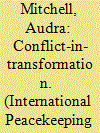

|
|
|
|
|
| Publication |
2009.
|
| Summary/Abstract |
Conflict transformation, and the 'liberalizing peace' paradigm of which it is a part, applies a specific ethos of transformation to the project of peacebuilding. This ethos reshapes conflict and the ways in which it is manifested. An ethico-phenomenological approach is used here to examine the phenomenon of 'conflict-in-transformation' (as opposed to 'peace') that this creates. To this end, the ethical critiques of Charles Taylor, the literature on 'emancipatory' forms of peacebuilding and the European Union's Programmes for Peace and Reconciliation in Northern Ireland are examined. This analysis is applied to phenomena of conflict-in-transformation in post-1998 Northern Ireland. In examining this case, the article highlights how an ethico-phenomenological approach can help to identify the (new) forms of conflict engendered by the liberalizing peace paradigm, with a view to transcending these through the development of new directions in theory and practice.
|
|
|
|
|
|
|
|
|
|
|
|
|
|
|
|
| 2 |
ID:
157595


|
|
|
| 3 |
ID:
122837
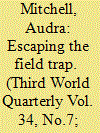

|
|
|
|
|
| Publication |
2013.
|
| Summary/Abstract |
There is a growing global demand for Northern universities to provide fieldwork opportunities in 'conflict zones' to students in applied International Relations (peace and conflict studies, post-conflict studies, human rights, development and related fields). This demand is generated in macro-level or structural dynamics emerging from three sources: the hiring criteria of major international organisations, competition between universities for fee-paying students and the social commodification of 'authentic' or 'real' life experience. At the micro level these dynamics can manifest themselves in exploitative relations, two of which are explored here. First, substantial inequalities (or a 'benefit gap') may arise between student researchers and their research subjects. Second, student researchers may find themselves in extractive relations with their research subjects. These dynamics lead to a situation in which some of the world's most vulnerable people are objectified as learning resources for students enrolled in (predominantly Northern) universities. The article argues that these dynamics are a problem of global politics, not just research ethics or pedagogy. It concludes with recommendations for reducing the potential for exploitation in educational fieldwork.
|
|
|
|
|
|
|
|
|
|
|
|
|
|
|
|
| 4 |
ID:
127800
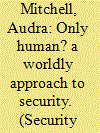

|
|
|
|
|
| Publication |
2014.
|
| Summary/Abstract |
Harm does not happen to humans in isolation, but rather to worlds composed of diverse beings. This article asks how worlds and the conditions of worldliness should be framed as 'subjects of security'. It explores three possible pathways: rejecting anthropocentrism; expanding existing ethical categories; and adopting 'new materialist' ontology and ethics. Ultimately, it argues for a fusion of the key elements of each of these pathways. This offers the basis for a new concept of harm ('mundicide') specifically intended to reflect harms to worlds and the conditions of worldliness. The value of this concept is demonstrated in the light of an empirical example: the 'Rainforest Chernobyl' case. The article concludes that a worldly approach is necessary if we are to capture the full enormity of the harms confronted by international security.
|
|
|
|
|
|
|
|
|
|
|
|
|
|
|
|
| 5 |
ID:
145984


|
|
|
|
|
| Summary/Abstract |
Planet Politics is about rewriting and rethinking International Relations as a set of practices, both intellectual and organisational. We use the polemical and rhetorical format of the political manifesto to open a space for inter-disciplinary growth and debate, and for thinking about legal and institutional reform. We hope to begin a dialogue about both the limits of IR, and of its possibilities for forming alliances and fostering interdisciplinarity that can draw upon climate science, the environmental humanities, and progressive international law to respond to changes wrought by the Anthropocene and a changing climate.
|
|
|
|
|
|
|
|
|
|
|
|
|
|
|
|
| 6 |
ID:
114981
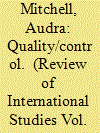

|
|
|
|
|
| Publication |
2011.
|
| Summary/Abstract |
Current discourses about the everyday in relation to international peace interventions focus on two main aspects. First, the perceived quality or qualities of everyday life tend to be attributed to 'local' organisations or actors and assessed positively. Second, the control of life (including bio-political control and governance) tends to be associated with 'international' actors and viewed negatively. This article challenges these key assumptions by contextualising them in social and political theories of the everyday and in two key examples: 'affective' peacebuilding in Bosnia-Herzegovina, and 'threatworks' in Northern Ireland. It also calls for an approach to the 'everyday' in international interventions which moves beyond local/international power dynamics and is attentive to the pluralities of power and practice that emerge in these settings.
|
|
|
|
|
|
|
|
|
|
|
|
|
|
|
|
| 7 |
ID:
175166
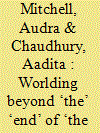

|
|
|
|
|
| Summary/Abstract |
We often hear that the ‘end of the world’ is approaching – but whose world, exactly, is expected to end? Over the last several decades, a popular and influential literature has emerged, in International Relations (IR), social sciences, and in popular culture, on subjects such as ‘human extinction’, ‘global catastrophic risks’, and eco-apocalypse. Written by scientists, political scientists, and journalists for wide public audiences,1 this genre diagnoses what it considers the most serious global threats and offers strategies to protect the future of ‘humanity’. This article will critically engage this genre to two ends: first, we aim to show that the present apocalyptic narratives embed a series of problematic assumptions which reveal that they are motivated not by a general concern with futures but rather with the task of securing white futures. Second, we seek to highlight how visions drawn from Black, Indigenous and People of Color (BIPOC) futurisms reimagine more just and vibrant futures.
|
|
|
|
|
|
|
|
|
|
|
|
|
|
|
|
|
|
|
|
|